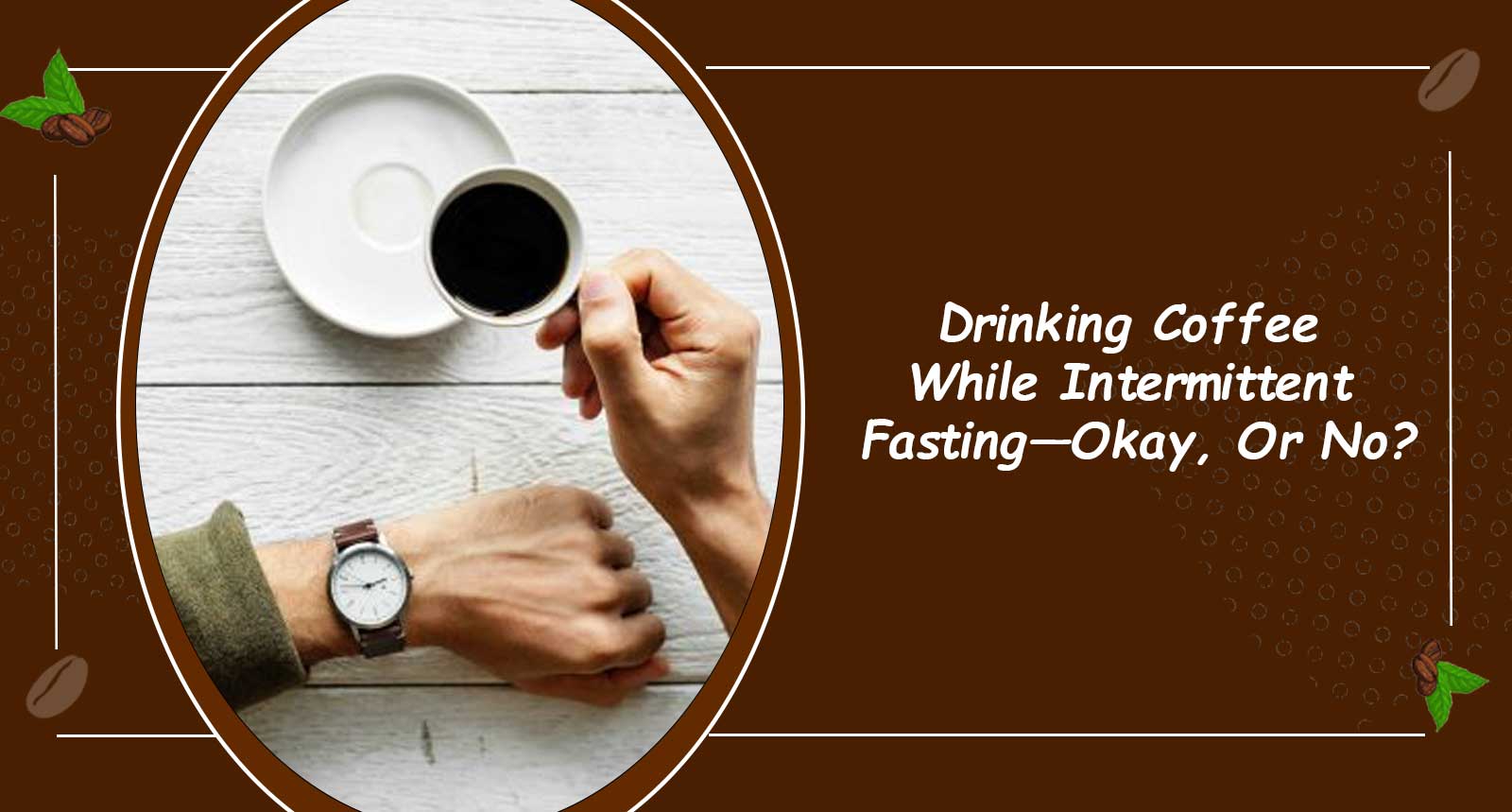Intermittent fasting, “Drinking Coffee While Intermittent Fasting—Okay, Or No?” is a topic that often stirs up questions and debates.
In this comprehensive guide, we’ll explore the effects of coffee consumption during intermittent fasting and whether it aligns with your health and wellness goals. We’ll delve into the science and help you make an informed decision.
Does Coffee Break a Fast?
Intermittent Fasting & Coffee
Intermittent fasting is an increasingly popular dietary approach that has shown promise in promoting weight loss, improving metabolic health, and enhancing longevity.
One of the key aspects of intermittent fasting is the period of fasting, during which you abstain from consuming calories. However, coffee, often a daily staple for many, raises questions about whether it disrupts this fasting period.
To understand whether coffee breaks a fast, it’s essential to explore the components of coffee and how they interact with the fasting process.
Coffee consists of various compounds, including caffeine, which can impact your fasting state in different ways.
Let’s delve into the details to provide you with a clear picture of whether sipping your morning brew is compatible with your intermittent fasting regimen.
How Coffee with Cream and Sugar Affects Fasting?
For many individuals, coffee is not just a source of caffeine but also a vessel for cream and sugar. While black coffee on its own may have minimal impact on your fasting state, the addition of cream and sugar can introduce calories and potentially disrupt the fasting process.
-Cream: Cream, especially heavy cream or half-and-half, contains fat and calories. When you consume coffee with cream during your fasting period, you introduce these calories into your system, which may trigger an insulin response.
Insulin is a hormone that plays a crucial role in regulating blood sugar levels and can affect the fasting state. However, the extent to which cream affects fasting can vary among individuals.
-Sugar: The addition of sugar to your coffee can have a more pronounced effect on fasting. Sugar is a source of carbohydrates and calories, which can substantially increase insulin levels.
Consuming sugar in your coffee during a fast can potentially lead to a significant metabolic response, raising questions about the true extent of your fasting state.
Drinking Coffee While Intermittent Fasting—Okay, Or No?
The question of whether it’s acceptable to enjoy a cup of coffee while practicing intermittent fasting is one that often leads to mixed opinions. To provide a comprehensive answer, it’s crucial to consider various factors that come into play.
Autophagy and Fasting Benefits
Intermittent fasting is known for its potential health benefits, including improved weight management, enhanced insulin sensitivity, and even the stimulation of autophagy.
Autophagy is a cellular process where your body cleans out damaged cells and regenerates new ones, which is believed to have anti-aging and longevity benefits. The primary concern is whether coffee interferes with these fasting-induced advantages.
Role of Caffeine
Coffee contains caffeine, a natural stimulant that can affect your metabolism. While caffeine is generally considered to be fasting-friendly, it’s crucial to understand its potential impact on your individual fasting goals.
For some, caffeine can suppress appetite and enhance fat burning, making it a valuable ally in intermittent fasting.
Coffee as an Appetite Suppressant
Coffee’s appetite-suppressing properties can be particularly advantageous during the fasting period, helping individuals control their hunger and make it easier to extend their fasts. This is a key reason why many people turn to coffee while intermittent fasting.
Potential Disruption of Insulin
On the other hand, the consumption of coffee with added sugars, cream, or other high-calorie additives could disrupt your fasting state by increasing insulin levels. It’s important to choose your coffee options wisely to avoid negating the fasting benefits.
Individual Variation
People’s responses to coffee during fasting can vary widely. Some individuals can enjoy coffee without any adverse effects on their fasting outcomes, while others may experience increased hunger or a metabolic response that disrupts their fasting goals.
Drinking coffee while intermittent fasting can be acceptable and even beneficial for many people, particularly when consumed in its purest form (black coffee).
It can help with appetite control and may enhance the fasting experience. However, it’s essential to be mindful of the potential impact of added ingredients like cream and sugar, as they can introduce calories and disrupt the fasting process.
Your personal experience and goals should guide your decision on whether coffee is compatible with your intermittent fasting journey. Experimentation and monitoring your body’s response can help you make an informed choice.
Does Coffee Burn Fat While Fasting?
The idea of coffee as a fat-burning elixir has been a point of interest for many individuals engaged in intermittent fasting and weight management. Let’s delve into the science behind the potential fat-burning properties of coffee during fasting.
Caffeine’s Role
Coffee is a well-known source of caffeine, a natural stimulant. Caffeine is believed to have the ability to increase metabolic rate and enhance fat oxidation, making it an attractive choice for those seeking to burn fat.
When consumed during a fast, caffeine can further boost these effects, potentially leading to increased fat breakdown.
Appetite Suppression
Coffee’s caffeine content can also act as an appetite suppressant. By reducing hunger and cravings, it may become easier to adhere to your fasting schedule and maintain a calorie deficit, which is essential for weight loss.
Enhanced Physical Performance
If your fasting routine includes physical activity, coffee’s stimulating effects may help improve your performance. This can translate to more effective workouts and, in turn, more effective fat burning.
Fat Loss and Fasting
Fasting itself promotes fat utilization for energy, especially during extended fasts. Coffee’s ability to enhance fat burning complements this natural process, potentially resulting in increased fat loss.
Coffee, primarily due to its caffeine content, has the potential to enhance fat burning when consumed during intermittent fasting.
It can help by increasing metabolic rate, reducing appetite, and improving physical performance. However, it’s essential to remember that coffee is not a miracle fat-burning solution on its own.
The most effective way to burn fat while fasting is to combine coffee with a well-structured fasting routine, a balanced diet, and regular physical activity.
What Drinks Won’t Break a Fast?
Maintaining a fasting state requires careful consideration of what you consume, as even seemingly innocuous beverages can disrupt your fast. If you’re looking to stay in a fasted state, here’s a list of drinks that typically won’t break your fast:
- Water: The ultimate fasting-friendly drink. Plain water has zero calories and won’t interfere with your fast. It can help keep you hydrated and curb hunger.
- Herbal Tea: Herbal teas like chamomile, peppermint, or hibiscus are naturally calorie-free and can be soothing during a fast. They can also help with digestion and relaxation.
- Green Tea: Unsweetened green tea contains minimal calories and is rich in antioxidants. It can support your metabolism and may even enhance fat oxidation.
- Black Coffee: Black coffee, with no added cream, sugar, or flavorings, is a popular choice among intermittent fasters. It’s low in calories and can provide a caffeine boost that may help with alertness and fat burning.
- Plain Sparkling Water: Sparkling water without sweeteners or flavorings is another option for those looking to add some variety to their beverages. It’s calorie-free and can provide a refreshing alternative to still water.
- Apple Cider Vinegar (Diluted): Some people choose to consume diluted apple cider vinegar while fasting. It’s low in calories and may have some potential health benefits, but be cautious with the amount to avoid any digestive discomfort.
- Electrolyte Supplements (No Calories): If you’re fasting for an extended period, electrolyte supplements with zero calories can help maintain electrolyte balance and prevent cramping or dizziness.
While these drinks are generally fasting-friendly, individual responses can vary. Some people may find that even zero-calorie options affect their fasting experience, so it’s crucial to monitor your body’s response.
Additionally, when in doubt, it’s advisable to stick to plain water, as it’s the safest choice to ensure you stay in a fasted state.
Always consult with a healthcare professional or nutritionist before making significant changes to your fasting routine to ensure it aligns with your health and wellness goals.
Conclusion
In the world of intermittent fasting, the question of whether you can enjoy a cup of coffee while fasting often depends on your individual goals and how your body responds.
Black coffee is generally considered compatible with fasting, the addition of cream and sugar can introduce calories and potentially disrupt the fasting process.

